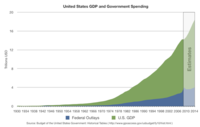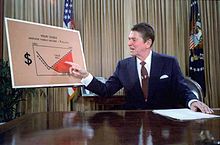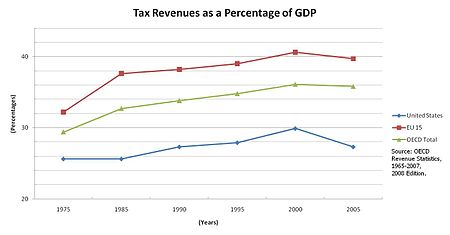- Starve the beast
-

Part of a series of articles on United States
budget and debt topicsMajor dimensions Federal budget · Public debt
Military budget
Expenditures · Taxation
Economy · Financial positionPrograms Medicare · Social Security Contemporary issues Health care reform · Social Security debate
Debt-ceiling crisis
Subprime mortgage crisis
Bush tax cuts · Starve the beast
Bowles-Simpson CommissionTerminology Inflation · Balance of payments  Reagan gives a televised address from the Oval Office, outlining his plan for tax reductions in July 1981
Reagan gives a televised address from the Oval Office, outlining his plan for tax reductions in July 1981
"Starving the beast" is a fiscal-political strategy of some American conservatives[1][2] to cut taxes, depriving the government of revenue in an effort to create a fiscal budget crisis that would then force the federal government to reduce spending. The assumption is that the government would not spend beyond its means (taxes). History has shown, however, that the US government - "the beast" - has instead borrowed money to maintain or increase its continued spending, generally resulting in increased United States public debt rather than dramatic reductions in the size or scope of government.
James M. Buchanan, a Nobel Prize-winning economist, helped develop the Fiscal Illusion hypothesis. It's obvious, he said, "borrowing allows spending to be made that will yield immediate political payoffs without the incurring of any immediate political cost."[3] In their book Democracy in Deficit (1977), Buchanan and Richard E. Wagner suggest that the complicated nature of the U.S. tax system causes fiscal illusion and results in greater public expenditure than would be the case in an idealized system in which everyone is aware in detail of what their share of the costs of government is.[4]
The tax cuts and deficit spending of former US President George W. Bush's administration were attempts to "starve the beast." Bush said in 2001 "so we have the tax relief plan [...] that now provides a new kind -- a fiscal straightjacket for Congress. And that's good for the taxpayers, and it's incredibly positive news if you're worried about a federal government that has been growing at a dramatic pace over the past eight years and it has been."[5] The tax cuts were extended by Barack Obama in a compromise with Congressional Republicans.
Former U.S. vice-presidential candidate Sarah Palin expressly advocates the policy: "please [Congress], starve the beast, don't perpetuate the problem, don't fund the largesse, we need to cut taxes."[6] U.S. Senator Jon Kyl (R-AZ), a member of the Senate Finance Committee, states "you should never have to offset the cost of a deliberate decision to reduce tax rates on Americans."[7]
Contents
History
Prior to being elected as the President, then-candidate Ronald Reagan foreshadowed the strategy during the 1980 US Presidential debates, saying "John Anderson tells us that first we've got to reduce spending before we can reduce taxes. Well, if you've got a kid that's extravagant, you can lecture him all you want to about his extravagance. Or you can cut his allowance and achieve the same end much quicker."[8]
It appears the earliest use of the term "starving the beast" to refer to the political-fiscal strategy was in a Wall Street Journal article in 1985 where the reporter quoted an unnamed Reagan staffer.[9]
Analysis: economic, academic, and "think tank"
Some empirical evidence shows that Starve the Beast may be counterproductive, with lower taxes actually corresponding to higher spending. An October 2007 study by Christina D. Romer and David H. Romer of the National Bureau of Economic Research found: "[...] no support for the hypothesis that tax cuts restrain government spending; indeed, [the findings] suggest that tax cuts may actually increase spending. The results also indicate that the main effect of tax cuts on the government budget is to induce subsequent legislated tax increases."[10]
William Niskanen, chairman emeritus of the libertarian Cato Institute, criticized “starve the beast.” If deficits finance 20% of government spending, then citizens perceive government services as discounted. Services that are popular at 20% off the listed price would be less popular at full price. He hypothesized that higher revenues could constrain spending, and found strong statistical support for that conjecture based on data from 1981 to 2005.[11][12] Another Cato researcher, Michael New, tested Niskanen’s model in different time periods and using a more restrictive definition of spending (non-defense discretionary spending) and arrived at a similar conclusion.[13]
Professor Leonard E. Berman of Syracuse University testified to a U.S. Senate committee in July 2010 that: "My guess is that if President Bush had announced a new war surtax to pay for Iraq or an increase in the Medicare payroll tax rate to pay for the prescription drug benefit, both initiatives would have been less popular. Given that the prescription drug benefit only passed Congress by one vote after an extraordinary amount of arm-twisting, it seems unlikely that it would have passed at all if accompanied by a tax increase. Starve the beast doesn’t work."[14]
Economist Bruce Bartlett called Starve the Beast "the most pernicious fiscal doctrine in history."[15]
Political commentary
A well-known proponent of the strategy is activist Grover Norquist. He has famously said, "My goal is to cut government in half in twenty-five years, to get it down to the size where we can drown it in the bathtub."[16][17] Vice-President Dick Cheney said "Reagan proved deficits don't matter" as then-Treasury Secretary Paul O'Neill warned of financial dangers presented by them ahead, according to O'Neill.[18]
Economist Paul Krugman summarized the strategy in February 2010: "Rather than proposing unpopular spending cuts, Republicans would push through popular tax cuts, with the deliberate intention of worsening the government’s fiscal position. Spending cuts could then be sold as a necessity rather than a choice, the only way to eliminate an unsustainable budget deficit." He wrote that the "...beast is starving, as planned..." and that "Republicans insist that the deficit must be eliminated, but they’re not willing either to raise taxes or to support cuts in any major government programs. And they’re not willing to participate in serious bipartisan discussions, either, because that might force them to explain their plan — and there isn’t any plan, except to regain power."[19]
"Feed The Beast"
There exists a related idea known as "Feed the Beast," which means increasing taxes for the purported purpose of balancing the budget only to make the government spend those inflows. Economists Stephen Moore and Richard Vedder have written in the Wall Street Journal editorial page that every new dollar of new taxes leads to more than one dollar of new spending according to their research. Their conclusions have been disputed by economist and writer Bruce Bartlett in The Fiscal Times, who stated that tax increases in the early 90s helped contribute to more austere budgets in the late 90s.[20][21]
See also
- Financial position of the United States
- Taxation in the United States
- Reaganomics
- Tax resistance
Individuals
References
- ^ "Europe's Welfare States". The Economist. Pralmeida.tripod.com. 2004-04-01. http://pralmeida.tripod.com/academia/05materiais/08TaxingPoorEcon.html. Retrieved 2010-12-09.
- ^ Bartlett, Bruce (2007-07-02). "Origins and Development of a Budget Metaphor". The Independent Review. Independent.org. http://www.independent.org/publications/the_lighthouse/detail.asp?id=188. Retrieved 2010-12-09.
- ^ Buchanan, James M. (1984). Dehe Deficit and American Democracy. Memphis: P. K. Steidman Foundation. ISBN 0-86597-227-3.
- ^ Buchanan, James M.; Wagner, Richard E. (1977). Democracy in Deficit: The Political Legacy of Lord Keynes. New York: Academic Press. ISBN 0-86597-227-3. http://www.econlib.org/library/Buchanan/buchCv8Contents.html. Retrieved 2011-01-19.
- ^ "President Announces Chairman of Joint Chiefs of Staff". Georgewbush-whitehouse.archives.gov. 2001-08-24. http://georgewbush-whitehouse.archives.gov/news/releases/2001/08/20010824.html. Retrieved 2010-12-09.
- ^ Weigel, David (2010-04-14). "Sarah Palin Boston speech (video)-April 14, 2010". Voices.washingtonpost.com. http://voices.washingtonpost.com/right-now/2010/04/palin_in_boston_please_starve.html. Retrieved 2010-12-09.
- ^ "Sen. Kyl Fox News Sunday appearance (video)-July 11, 2010". Dailykos.com. http://www.dailykos.com/tv/w/002748/. Retrieved 2010-12-09.
- ^ Post Store (May 8, 2006). "Mallaby, Sebastian. Don't Feed the Beast: Bush Should End This Tax-cut Myth". The Washington Post. Washingtonpost.com. http://www.washingtonpost.com/wp-dyn/content/article/2006/05/07/AR2006050700924.html. Retrieved 2010-12-09.
- ^ "Starve the Beast: Origins and Development of a Budgetary Metaphor". The Independent Review. The Independent Institute (Independent.org). http://www.independent.org/publications/tir/article.asp?issueID=50&articleID=641. Retrieved 2010-12-09.
- ^ "Do Tax Cuts Starve the Beast: The Effect of Tax Changes on Government Spending National Bureau of Economic Research. Working Paper No. 13548" (PDF). October 2007. http://elsa.berkeley.edu/~dromer/papers/draft509.pdf. Retrieved 2010-12-09.
- ^ William Niskanen. "26(3):553-558, Fall 2006-Limiting Government: The Failure of "Starve the Beast"" (PDF). Cato Journal. http://www.cato.org/pubs/journal/cj26n3/cj26n3-8.pdf. Retrieved 2010-12-09.
- ^ Ezra Klein (2010-09-18). "The true test of the tea parties' mettle". Washington Post. Washingtonpost.com. http://www.washingtonpost.com/wp-dyn/content/article/2010/09/18/AR2010091802861.html. Retrieved 2010-12-09.
- ^ Michael J. New-“Starve the Beast: A Further Examination,” Cato Journal, 29(3): 487-495, Fall 2009.
- ^ "Senate Testimony of Professor Leonard E. Berman" (PDF). July 14, 2010. http://www.maxwell.syr.edu/uploadedFiles/burman%20testimony%20071410.pdf. Retrieved 2010-12-09.
- ^ Bartlett, Bruce. Tax Cuts And 'Starving The Beast' - The most pernicious fiscal doctrine in history., Forbes, May 7, 2010
- ^ Ed Kilgore. "Starving the Beast". Blueprint Magazine. Archived from the original on 2004-11-20. http://web.archive.org/web/20041120220704/http://www.ppionline.org/ndol/print.cfm?contentid=251788. Retrieved 2010-12-09.
- ^ "Article | The American Prospect". Prospect.org. 2005-03-15. http://www.prospect.org/cs/articles?articleId=9335. Retrieved 2010-12-09.
- ^ Post Store (2004-06-09). "Reagan Policies Gave Green Light to Red Ink". washingtonpost.com. http://www.washingtonpost.com/ac2/wp-dyn/A26402-2004Jun8. Retrieved 2010-12-09.
- ^ NYT-Paul Krugman-The Bankruptcy Boys-February 2010
- ^ http://www.thefiscaltimes.com/Columns/2010/11/26/Bartlett-Starve-The-Beast.aspx
- ^ Stephen Moore; Richard Vedder (November 21, 2010). "Higher Taxes Won't Reduce the Deficit". Wall Street Journal. http://online.wsj.com/article/SB10001424052748704648604575620502560925156.html. Retrieved March 24, 2011.
Further reading
- The Word Spy - starve the beast
- The "No New Taxes" Pledge
- “Starve the Beast:" Origins and Development of a Budgetary Metaphor
- Stoking the Beast
- The Real Reason We Need a Tax Cut
Anarcho-capitalism 
Features Aggression insurance · Crime insurance · Dispute resolution organization · Free-market roads · Jurisdictional arbitrage · Non-aggression principle · Polycentric law · Private defense agency · Private Governance · Self-ownership · Spontaneous orderCategories:- Political theories
- Economic theories
- Tax resistance in the United States
- Government finances in the United States
- Taxation in the United States
- United States federal budgets
- American political slogans
- Economic liberalism
- Anarcho-capitalism
Wikimedia Foundation. 2010.

